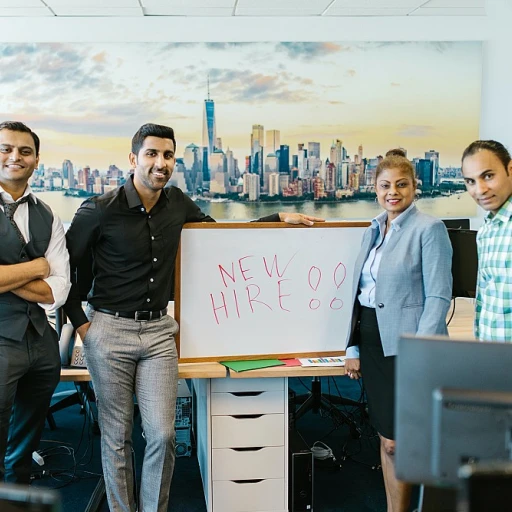Understanding the Concept of Diverse Staffing
Unveiling the Essence of Diversified Staffing
The term "diverse staffing" has gained significant traction in recent years within the management landscape. It embodies the practice of recruiting a workforce that spans various backgrounds, skills, and perspectives, which aligns with the growing emphasis on workplace inclusion. This approach not only benefits companies but also enhances the user experience by creating a harmonious environment where diverse ideas can flourish. The core idea behind diversified staffing is to broaden the scope of talent acquisition, ensuring that job seekers from different walks of life have equal career opportunities. Whether in manufacturing, skilled trades, or customer service roles, diverse staffing offers a plethora of job listings for those ready to apply. This variety ensures that businesses are equipped with a team that mirrors the multifaceted society they serve. Moreover, managers play a pivotal role in promoting diverse staffing solutions by integrating practices that make recruitment processes more inclusive. By doing so, they help job seekers find jobs that resonate with their unique skill sets while propelling organizations towards more innovative solutions. For companies embarking on this journey, understanding the essence of diverse staffing is integral. Not only does it pave the way for enhanced creativity and problem-solving, but it also acts as a bridge to connect various job seekers with suitable careers. If you're considering implementing diversified staffing in your organization, our comprehensive guide on effective strategies for recruitment management offers valuable insights and actionable steps to streamline your efforts. As we continue to explore this subject, we'll delve into the challenges faced by management in its implementation, examine successful case studies, and discuss future trends that promise to reshape the staffing sphere.The Role of Management in Promoting Diversity
Leading Diversity Initiatives
The role of management is crucial in promoting diversity within an organization. Effective management not only acknowledges the growing importance of a diversified workforce but also actively takes steps to master the art of managing people in HR. By doing so, they foster an inclusive environment where gifted individuals from various backgrounds can thrive and contribute to the organization's success.
Managers are tasked with overseeing the talent acquisition processes, ensuring these are inherently unbiased and welcoming to a wide range of candidates. This includes implementing staffing solutions and crafting job listings that appeal to skilled trades and various career opportunities. It's also important for managers to prepare their teams to interact with candidates during interviews effectively, eventually making well-rounded hiring decisions.
At the executive level, there should be a commitment to adopt staffing recruiting policies that prioritize diverse staffing to reflect the rich mosaic of societal composition. This dedication often involves setting measurable goals for diversified staffing, frequent assessments of progress, and a readiness to adjust tactics as required.
The management's role extends to integrating temporary job positions and direct hire opportunities, which not only bolster a company's internal capabilities but help find job seekers who can join the team swiftly. Providing necessary support, like interview coaching and job search resources, enhances the user experience for career aspirants, encouraging them to apply.
Therefore, successful management in this regard involves a delicate balance between leadership and support services, ensuring that both job seekers and current employees are ready to embrace a culturally rich workplace. The shift towards a diverse employment strategy opens broad opportunities that drive innovation and problem-solving across the organization.
Challenges Faced in Implementing Diverse Staffing
Overcoming Barriers in Achieving a Diversified Staffing
Promoting diversity within staffing roles presents numerous challenges that organizations must address to successfully implement diversified teams. These challenges span across various levels of the recruitment and operational process, with each necessitating careful consideration and informed solutions. First, there's the challenge of overcoming inherent biases in the hiring process. Organizations may unconsciously favor certain candidates over others due to longstanding stereotypes or a lack of awareness. Leveraging staffing solutions that incorporate unbiased interview questions and structured hiring processes can help. Another persistent issue is the limited reach of traditional job listings. Many job seekers in underserved communities may not have access to, or be aware of, the career opportunities presented through standard job postings. To combat this, companies can expand their job listings across more inclusive platforms or partner with staffing services that cater to a diverse candidate pool. Retention of diverse talent is equally challenging. New team members, regardless of background, need a supportive, inclusive environment that fosters growth and acknowledges individual contributions. Management must be proactive in creating policies and practices that cater not only to current employees but also to those they aim to attract. Companies may also face difficulties in identifying and quantifying the benefits of a diverse workforce. While the long-term gains include increased innovation and better customer service, these are not immediately visible, making it harder to justify the efforts internally. Here, planning and a clear communication strategy can be pivotal. Aligning diverse staffing efforts with direct hire and effective talent acquisition strategies can demonstrate real-world impacts and Return on Investment (ROI). For manufacturing and skilled trades in particular, achieving diversified staffing can be daunting due to preconceived gender roles and industry norms. Establishing partnerships with educational institutions and community organizations can provide new avenues for attracting and recruiting diverse talent. Employers must be ready to implement solutions that match their unique organizational context. By addressing these challenges with a strategic approach, businesses can unlock opportunities within diversified staffing, leading to a proficient, well-rounded team ready to meet evolving market demands. More insights on creating effective diversity strategies can be found through effective ways to manage diversity in the workplace.Case Studies of Successful Diverse Staffing
Inspiring Success through Proven Models
Exploring case studies of successful diverse staffing can empower organizations to implement effective strategies tailored to their unique needs. By analyzing these examples, management can uncover insights into cultivating inclusive environments, refining staffing solutions, and advancing talent acquisition. A standout case is within the manufacturing sector, where a company tackled its staffing needs by linking diversified staffing with skilled trades. By curating a diverse job seekers pool, they filled temporary positions, ultimately converting them to career opportunities, demonstrating how diverse talent can address staffing challenges while boosting team innovation. In another scenario, a tech company saw success by focusing on direct hire solutions, prioritizing varied job listings to attract diverse candidates ready to join the team. Through targeted interview questions, they crafted a seamless user experience, ensuring candidates felt welcomed and valued, thus increasing their staffing recruiting efficiency. Retail and customer service are other areas where diverse staffing is crucial. One retail chain offered job opportunities that promoted inclusivity, understanding that a diverse crew could enhance customer relations. They understood the value in providing training tailored to different backgrounds and cultures, answering interview questions with empathy and cultural awareness. These examples reveal that companies which successfully implement diverse staffing cultivate inclusivity by prioritizing human connection and respect. By applying these insights, organizations can become both a beacon for diversity and a place where people are eager to join, skip content like privacy policy hurdles, and find job satisfaction in an enriched environment. Using diversified staffing methods can propel organizations towards innovative solutions, offering a brighter horizon for both employees and employers alike.Tools and Resources for Effective Diverse Staffing
Resources and Tools for Implementing Diverse Staffing Solutions
Navigating the world of diversified staffing requires strategic tools and resources to maximize the effectiveness of your hiring processes. By utilizing the right staffing services and solutions, managers can efficiently address the demands of diversified job roles, spanning everything from temporary positions to permanent hires across various industries such as manufacturing, customer service, and skilled trades.
Below are some essential tools and resources:
- Staffing Recruiting Platforms: Utilizing platforms that specialize in talent acquisition can significantly ease the process of finding diverse candidates. These platforms often provide an extensive range of job listings that cater to diverse needs and help you find job seekers with varied skill sets.
- Job Listings and Direct Hire Services: Make use of job listing platforms that allow you to browse jobs and screen a wide array of candidates ready to join your team. Direct hire services enable you to secure talent who are well-suited for permanent roles within your organization.
- Interview Tools: When you're ready to interview potential candidates, leveraging tools that offer structured interview questions and techniques can help ensure a fair and unbiased evaluation process. Such tools can also enhance the user experience during the interview phase, providing job seekers with a positive impression of your company.
- Team Collaboration Tools: To promote a harmonious work environment after applicants have joined your team, consider deploying collaboration tools that facilitate communication among team members, ensuring that diverse perspectives are valued and heard.
- Career Services and Support: Offering career services to employees, such as career development programs or mentorship opportunities, can enhance retention rates and help in building a more inclusive and supportive workplace culture.
These resources not only create opportunities for diverse talent but also uphold the principles of privacy policy compliance and ethical hiring practices. As you explore these tools, remember that diverse staffing requires both strategic intent and a willingness to adapt to evolving industry trends and practices.
Future Trends in Diverse Staffing
Adapting to the Future of the Workforce
Diverse staffing is evolving as organizations seek fresh methods to integrate various talent into their workforce. Emerging trends indicate a strong inclination towards more flexible working structures, which are essential for tapping into wider job markets and attracting talent from different backgrounds.- Highlights of Future Trends:
With the rise of remote work opportunities, staffing solutions are adapting to accommodate location-independent roles. This shift can magnify the reach of potential talent pools and offer job seekers a broader range of career opportunities. It enables companies to find job candidates who best fit their requirements, irrespective of geographical constraints. - Technological Advancements:
Tools aiding talent acquisition, such as AI-driven staffing services and diverse job listings platforms, are increasingly employed to enhance the efficiency of the hiring process. These technologies provide sophisticated user experiences and privacy policies that cater to both employers and job seekers, thus improving the overall interview process. - Focus on Inclusivity:
Efforts to create inclusive environments are prioritized by employing diversified staffing models. Companies are considering more thoughtful interview questions and innovative solutions to eliminate bias during the hiring phase, ensuring they offer truly equal opportunities and recruit a balanced team. These initiatives support direct hire positions and temporary roles alike, making organizations ready to join team members from a variety of backgrounds.












